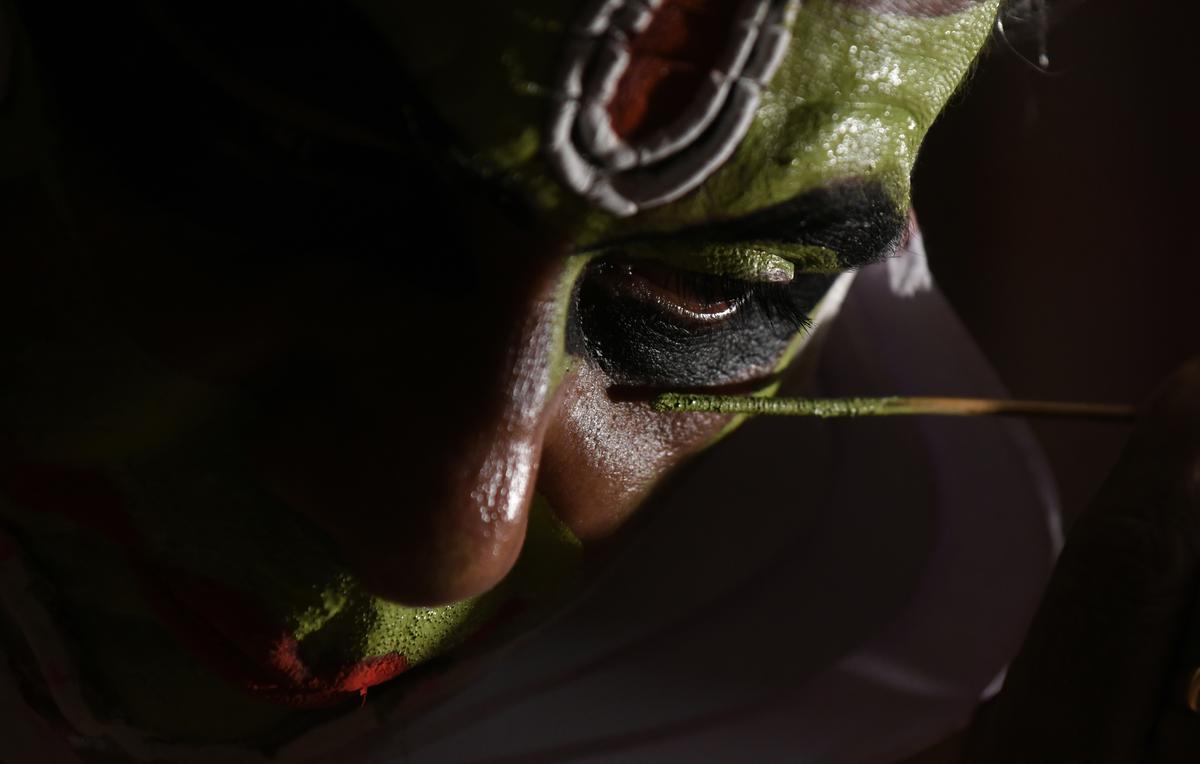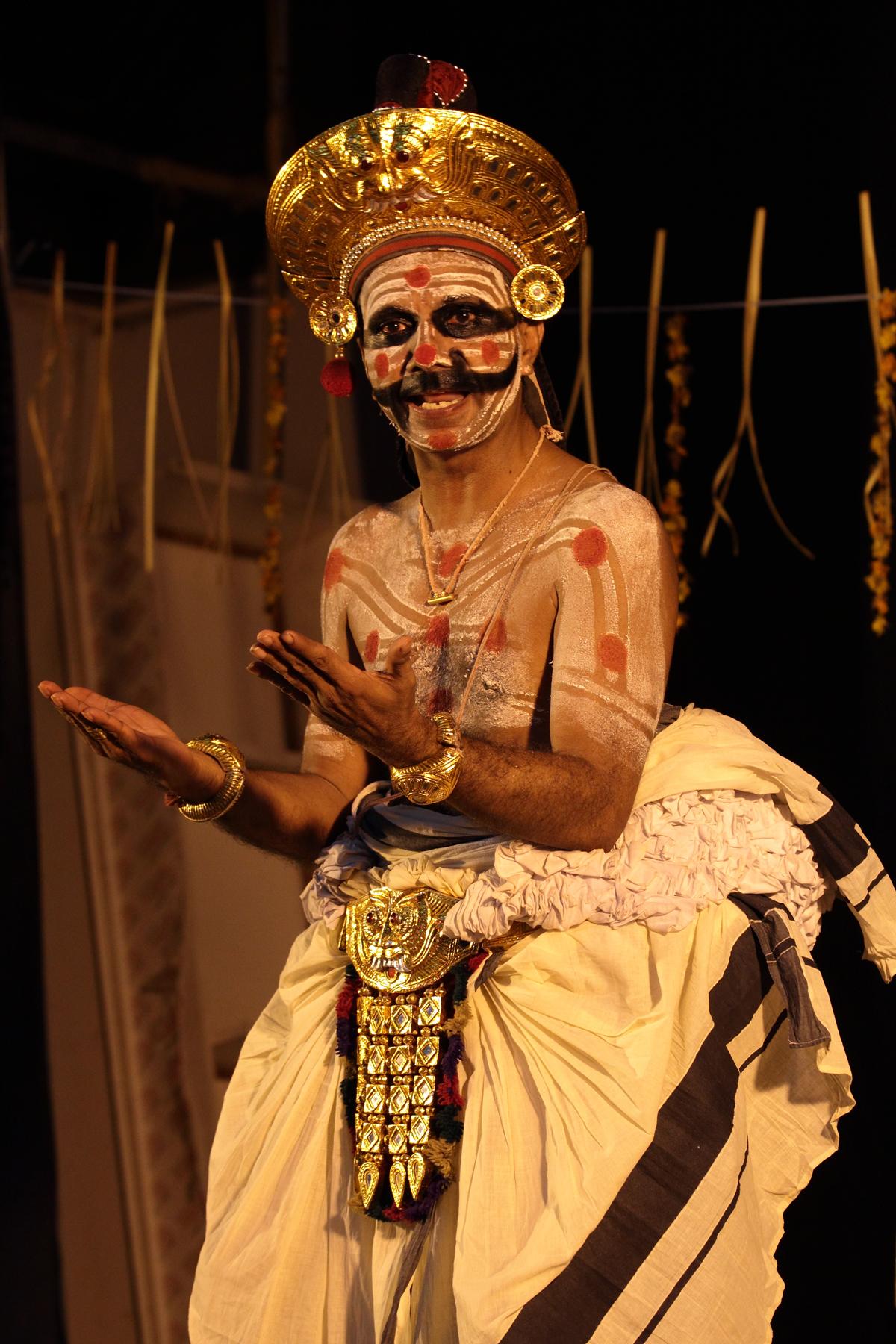Margi Sajeev
| Photo Credit: Special Arrangement
Margi Sajeev Narayana Chakyar as the love-smitten Ravana sits glued to his peetam (stool) for a little over three hours and slowly, using only his eyes and face, portrays the expressions on Ravana’s ten faces as they react to Sita’s beauty. As Soorpanakha, his act evokes sympathy for the demoness. Every role that is physically demanding or needs long periods of concentration is safe in the hands of this versatile actor.
A day-long event on June 2 to honour Sajeev on his 60th birthday was an occasion for the Koodiyattam community to celebrate the art form and at the same time voice concerns over its future. A common refrain heard from many gurus and speakers is the failure to draw new students, especially boys, because of the lack of patronage faced by the artistes.
Sajeev, who has spent 45 years as a Koodiyattam actor and guru, says very little has changed in this respect. “I still remember the day I moved to Thiruvananthapuram from Moozhikkulam with my younger brother Madhu. It was shortly after my arangetram at age 14. The move came after Margi (popular institution) started Koodiyattam classes and my father was appointed the teacher. We were excited about going to a big city but at the same time like all Koodiyattam practitioners wondered if the art form can provide a livelihood.”

Margi Sajeev applying make up before a performance at Ammannur Chachu Chakyar Gurukulam, Irinjalakuda
| Photo Credit:
THULASI KAKKAT
Sajeev recalls with a chuckle that he and his brother started learning typewriting and shorthand as a backup option, with half-hearted permission from his gurus. “Though I am happy to say today that we never had to fall back on it, the question of an uncertain future continues to bother Koodiyattam students. It is not easy to draw new learners. Some dropout midway while some others take up other professions.
Sajeev, currently the head of Koodiyattam at Margi Thiruvananthapuram, was trained in the traditional gurukula by his father Kochukuttan Chakyar and his uncle Ammannur Madhava Chakyar.
Koodiyattam was undergoing seismic shifts when Sajeev was growing up. The ritual art form, performed only in temples, moved to the performance arena. Once taught only at gurukulas run by the Chakyar families, training began to be imparted at institutions when Kerala Kalamandalam, now a performing arts university, offered classes in Koodiyattam for the first time in 1965. And Koodiyattam ceased to be the exclusive domain of Chakyar and Nambiar communities.
Margi Sajeev Narayana Chakyar, Margi Akhil and Kalamandalam Sindhu in the roles of Mayarama , Mayalakshmana and Sita, respectively.
| Photo Credit:
Jawaharji K
According to Sajeev, there have been major changes in the world of Koodiyattam — in the way it is taught and performed, in its costumes, and in new stories that are being adapted. Ammannur, a visiting professor at Margi, used to follow the gurukula system. “There was no syllabus. We took up a new story or role only when our gurus thought we had mastered what was being taught. For example, we did Nithyakriya, a preliminary pure dance sequence, for three years.”
The situation had changed by the time Sajeev became a teacher at Margi. “Now students have to balance academics and Koodiyattam training. At Margi, we adapted by introducing weekend classes conducted from 9 a.m. to 4 p.m. Later these were shortened to forenoon sessions. Koodiyattam became secondary to formal education.”
But Sajeev is realistic and says such changes are inevitable. “We must adapt to the changing times without compromising on the inherent values of the art form.”

Margi Sajeev Narayana Chakyar as Kaundinya
| Photo Credit:
Jawaharji K
Sajeev finds young Koodiyattam artistes talented and committed. “But they lack opportunities. Most of the Koodiyattam programmes now are of two-or three-hour duration. So young artistes have knowledge of a limited repertoire. There are only a few venues where the long form of Koodiyattam is presented.”
However, Sajeev is happy that Nepathya at Moozhikkulam stages complete performances in collaboration with scholars led by Prof David Shulman of Jerusalem University. “The Sangeet Natak Akademi has also been doing some great work through its Koodiyattam Kendra in Thiruvananthapuram. We need to preserve the only surviving Sanskrit theatre,” says Sajeev.